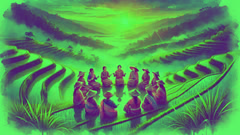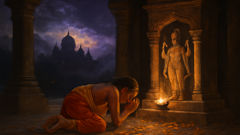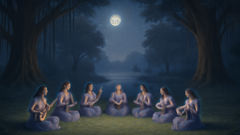Introduction
The Cordillera Mountains rise like green fortresses over Northern Luzon, their spines etched with ancient terraces where rice paddies reflect the changing sky. This land is alive with the whispers of ancestors, carried on the wind through the valleys and over the ridges. Here dwell the Ifugao people, whose hands have shaped mountains into gardens and whose voices have carved epics into the living memory of their community. The Hudhud is more than a song—it is a tapestry woven from legend, history, and ritual, echoing across generations. At dawn, as mist drifts among the terraces, the chants begin. Women’s voices, strong and melodic, recall the exploits of heroes and the wisdom of elders. Their stories are rooted in the soil and rivers, rising to honor the spirits believed to guard the harvest and guide the living. To listen to the Hudhud is to enter a world where boundaries blur: mortals converse with deities, ancestors linger beside the living, and the fate of a single rice stalk reflects the fate of an entire people. Through these chants, we meet Aliguyon, the brave warrior of Nagacadan; Bugan, the wise and compassionate daughter; and the spirits who dwell in rocks, trees, and wind. Their trials and triumphs are never just their own—they mirror the struggles and hopes of every Ifugao. The Hudhud is sung at rice-planting and harvest, at wakes, and on sacred days, binding community and land in a cycle as enduring as the terraces themselves. In the world of the Ifugao, every stone has a story, every field a lesson. As the Hudhud’s verses unfurl, they reveal not just the exploits of legendary figures but the values at the heart of Ifugao culture: kinship, resilience, respect for nature, and a humility before forces greater than oneself. The Hudhud is a living epic, a bridge between past and present, and an invitation to listen deeply—not only to words, but to the rhythms of earth and spirit that sustain a people across centuries.
The Birth of Aliguyon: A Warrior’s Destiny
In the village of Nagacadan, where the river bends like a silver serpent through emerald paddies, a child was born under auspicious signs. The night was silent but for the croak of tree frogs and the distant rumble of thunder. As the first light crept over the mountains, the child’s mother, Dumulao, named him Aliguyon. The elders saw in him a gleam that set him apart—a curiosity quick as a bird’s and a strength he wore lightly, like a woven sash. His father, Amtalao, was known as a skilled warrior and a man of fairness. He trained Aliguyon in the art of the spear and the dance of the shield, but also in the patience required to read omens and listen to the wind’s advice. In Ifugao society, heroism was not just about victory in battle, but about wisdom, restraint, and knowing when to seek peace.
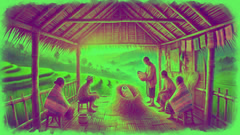
Aliguyon’s childhood was filled with lessons that would serve him in years to come. He learned to tend rice terraces, shaping the land with his bare hands. He learned the power of story—how the Hudhud preserved not only feats of valor but also the quiet acts of everyday life. Through his mother, Aliguyon came to understand the balance between masculine and feminine wisdom; how to be brave, but also kind; how to defend, but also to nurture.
When he was old enough, Aliguyon sought to prove himself. Word reached him of his father’s old adversary, Pangaiwan, who lived across the mountain in Daligdigan. An ancient feud simmered between their clans, with grievances passed down like heirlooms. Yet Aliguyon was not driven by hatred; instead, he wanted to test his skills and perhaps bring honor not just to himself, but to his people by resolving an old wound.
He set out at sunrise, spear in hand, his mother’s blessing woven into a talisman around his neck. Along the path, he met spirits disguised as birds and old women—messengers who warned him of pride and the dangers of anger. Aliguyon listened. He offered rice and prayers at sacred groves, asking the ancestors to watch over his journey. Each step he took was a verse in an unwritten chant, his story growing with every decision.
The encounter with Pangaiwan was fierce but remarkable. For days, neither warrior could best the other; their skills matched like two halves of a song. The villagers watched in awe as they exchanged blows and words, each learning from the other. At last, exhaustion brought a new clarity. Instead of pushing for victory, Aliguyon lowered his spear and spoke: “Let us end this with peace, so our children may harvest in safety.” Pangaiwan, moved by his rival’s wisdom, agreed. The feud was ended not by blood, but by mutual respect—a victory that echoed through the Hudhud for generations to come.
Bugan and the Wisdom of the Terraces
Beneath the great trees of the forest, where moss clings to ancient stones and the air is thick with the scent of earth after rain, Bugan walked in silence. She was not a warrior in the way her brother Aliguyon was, but the village recognized her for a different strength—a keen mind, a gentle heart, and an uncanny ability to coax life from stubborn soil. From childhood, Bugan had been drawn to places where the wild pressed close to the edge of cultivated fields, believing that the spirits of both worlds must be honored for harmony to flourish.
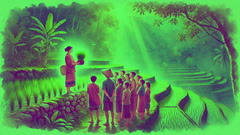
It was Bugan who convinced her people to plant certain herbs among the rice, keeping pests at bay without angering the spirit-guardians of the water. She listened to the stories of old women who remembered floods and droughts, using their wisdom to read the omens in cloud and bird. When rice harvests were threatened by blight, it was Bugan who led rituals by the river, her voice ringing clear as she called for guidance from Lumawig, the great ancestor-spirit.
One season, a drought settled over Nagacadan. The terraces dried and cracked, and worry spread like shadow among the villagers. Some urged quick action—sacrifice animals, dig deeper ditches, pray louder. But Bugan counseled patience. She led the youth to restore an old spring above the terraces, taught them to build bamboo channels, and organized a feast not of plenty but of hope. The Hudhud chanted through the nights, reinforcing faith in ancestral strength and unity.
During this time, Bugan’s resolve was tested. The spirits seemed silent; some villagers grumbled that tradition was failing them. Yet, Bugan held fast, believing that hardship could teach as much as prosperity. When the rains finally came—soft at first, then pounding—the terraces revived. The community rejoiced not just in survival, but in what they had learned: resilience, ingenuity, and trust in one another.
Bugan’s legacy endured in every field and every family. Her story became a central thread in the Hudhud—an epic not only of warriors but of those who kept the land alive with wisdom and compassion.
Conclusion
The Hudhud is more than an ancient song; it is the pulse of the Ifugao spirit, carrying echoes of ancestral voices across time. In its verses live Aliguyon’s courage tempered by peace and Bugan’s wisdom rooted in earth and tradition. Through their stories, generations have learned that true strength lies not only in victory or survival but in unity, respect for nature, and honoring both elders and the unseen. The rice terraces stand today as proof that harmony between people and land is possible when guided by knowledge and humility. As long as the Hudhud is sung—at planting, at harvest, or in quiet twilight—its lessons remain alive, shaping not just memory but the very soul of a community. And in that song, the world can still hear the steadfast heart of the Ifugao.

